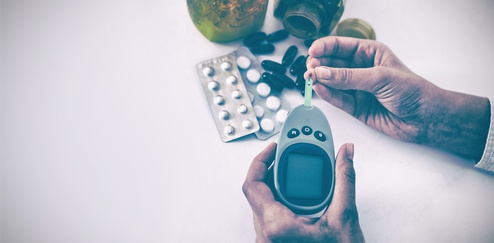A cohort study of 140,352 diabetics showed that sodium-glucose cotransporter 2 (SGLT2 inhibitors) diabetes drugs were associated with approximately twice the risk of diabetic ketoacidosis as were dipeptidyl peptidase-4 (DPP4 inhibitors) diabetes drugs according to a recent letter to the New England Journal of Medicine. SGLT2 inhibitors are a class of prescription medicines that are FDA-approved to lower blood sugar in adults with type 2 diabetes. Medicines in the SGLT2 inhibitor class include Invokana (canagliflozin), Invokamet (canagliflozin and metformin), Farxiga (dapagliflozin), Xigduo XR (dapagliflozin and metformin), Jardiance (empagliflozin) and Glyxambi (empagliflozin and linagliptin). As described by the American Diabetes Association,
“Diabetic ketoacidosis (DKA) is a serious condition that can lead to diabetic coma (passing out for a long time) or even death. When your cells don’t get the glucose they need for energy, your body begins to burn fat for energy, which produces ketones. Ketones are chemicals that the body creates when it breaks down fat to use for energy. The body does this when it doesn’t have enough insulin to use glucose, the body’s normal source of energy. When ketones build up in the blood, they make it more acidic. They are a warning sign that your diabetes is out of control or that you are getting sick.
High levels of ketones can poison the body. When levels get too high, you can develop DKA.”
The study’s reported finding is consistent with previous case reports that have suggested that SGLT2 inhibitors may be associated with an increased risk of diabetic ketoacidosis, which led to a warning from the Food and Drug Administration (FDA) in May 2015. Specifically, the FDA’s review of the FDA Adverse Event Reporting System (FAERS) database from March 2013 to May 2015 identified 73 cases of ketoacidosis in patients with type 1 or type 2 diabetes treated with SGLT2 inhibitors. As pointed out by the FDA, FAERS only includes reports submitted to FDA, so there are likely additional unreported cases.
In December 2015, the FDA announced that the labels for all drugs in this class would be updated to include information about diabetic ketoacidosis. The labels were also modified with information about life-threatening blood infections (urosepsis) and kidney infections (pyelonephritis) that originate as urinary tract infections.
Lawsuits have and continue to be filed against the drug manufacturers by patients diagnosed with diabetic ketoacidosis, kidney failure, and severe infection. There is a federal MDL overseeing hundreds of cases involving Invokana and Invokamet in the U.S. District Court, District of New Jersey (MDL 2750) before US District Judge Brian R. Martinotti. A MDL is a type of legal proceeding that helps federal courts efficiently manage many similar cases filed in many different courts across the U.S. by allowing the temporary transfer of all of the federal civil lawsuits to one or more district courts for pretrial consolidation or coordination.
Borgess Law will continue to keep you updated on the status of the litigation.
How We Can Help:
If you or someone you love has suffered ketoacidosis, kidney failure, or blood or kidney infections after taking Invokana, Invokamet or another SGLT2 inhibitor, you should be aware of the ongoing litigation.
Attorney Pamela A. Borgess, the founder of Borgess Law, LLC, has extensive experience with numerous national high-profile defective medical drug/device cases. Attorney Borgess will happy to discuss your legal options. For more information about the SGLT2 lawsuits or to discuss a potential claim, contact Borgess Law at (567) 455-5955 or toll-free at (844) LAW-9144. You can also contact Borgess Law by submitting an online inquiry. Borgess Law never charges for initial consultations. We welcome any questions you may have.
